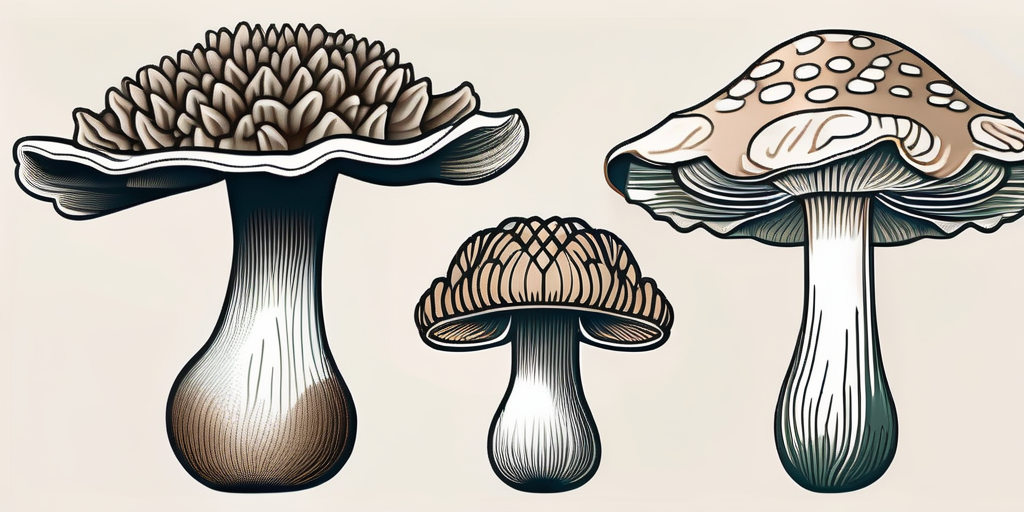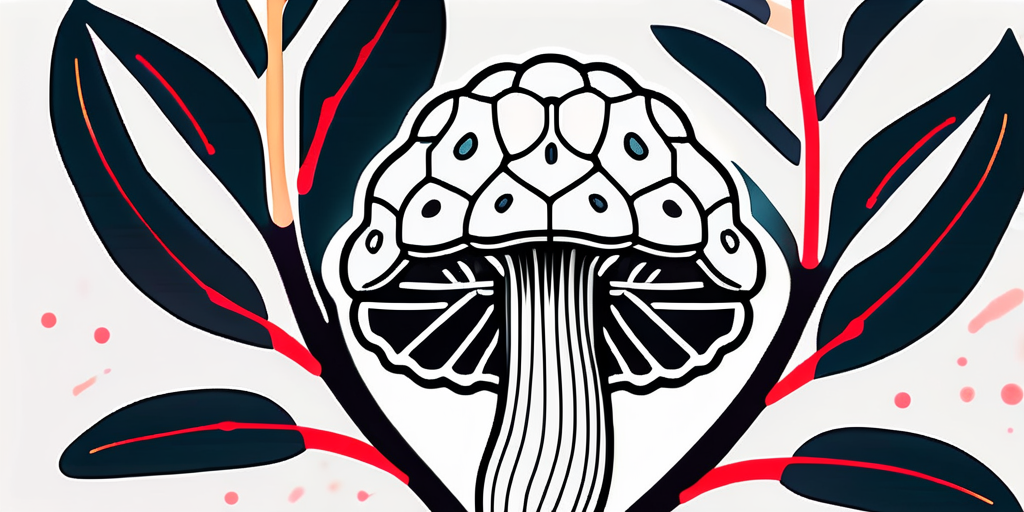Maitake Mushroom: The Key to Balancing Blood Sugar?
 Discover the potential benefits of maitake mushroom in balancing blood sugar levels.
Discover the potential benefits of maitake mushroom in balancing blood sugar levels.
Maitake Mushroom: The Key to Balancing Blood Sugar?
Mushrooms have long been valued for their unique taste and texture, but did you know that certain varieties may also hold the key to balancing blood sugar levels? One such mushroom is the Maitake mushroom, also known as "Hen of the Woods." In this article, we will explore the fascinating world of the Maitake mushroom and its potential benefits for blood sugar regulation.
Understanding the Maitake Mushroom
The Maitake mushroom, scientifically known as Grifola frondosa, is a type of edible fungus native to mountainous regions of Japan, North America, and Europe. With its distinctive ruffled appearance, this mushroom is highly prized in culinary traditions around the world.

Origin and History of Maitake Mushroom
The Maitake mushroom has a rich history dating back thousands of years. It has been used in traditional medicine as a natural remedy for various ailments and is highly regarded for its potential health benefits. In Japanese culture, the Maitake mushroom is often referred to as the "Dancing Mushroom" due to the joyful dances reportedly performed by those who found this valuable fungus in the wild.
Legend has it that the Maitake mushroom was so highly valued in ancient times that it was worth its weight in silver, leading to its nickname as the "King of Mushrooms." This esteemed reputation has persisted through the ages, with modern research continuing to uncover new potential health benefits associated with this remarkable fungus.
Nutritional Profile of Maitake Mushroom
In addition to its unique taste and texture, the Maitake mushroom boasts an impressive nutritional profile. It is rich in vitamins B and C, as well as minerals such as potassium and magnesium. Moreover, it is a low-calorie food and contains little to no fat, making it an excellent choice for those looking to maintain a healthy diet.
Studies have shown that the Maitake mushroom also contains bioactive compounds that may help support the immune system and promote overall well-being. Its rich umami flavor makes it a versatile ingredient in various dishes, from soups and stir-fries to pasta and salads, adding a depth of flavor and a nutritional boost to any meal.
The Connection Between Maitake Mushroom and Blood Sugar
Recent scientific research has shown a potential link between the Maitake mushroom and blood sugar regulation. Let's explore the science behind this fascinating connection.

The Science Behind Maitake Mushroom and Glucose Regulation
Studies have suggested that certain compounds present in the Maitake mushroom may help regulate glucose levels in the body. One such compound is beta-glucan, a type of soluble fiber that has been shown to slow down the absorption of glucose in the intestine, preventing sudden spikes in blood sugar levels.
Furthermore, research has indicated that Maitake mushroom extract may have a positive impact on insulin resistance, a condition in which the cells become less responsive to the effects of insulin. By improving insulin sensitivity, Maitake mushroom could potentially help the body utilize glucose more effectively, leading to better blood sugar control.
Moreover, Maitake mushrooms are also rich in vitamins and minerals that play a crucial role in overall health. These mushrooms contain significant amounts of vitamins B and C, as well as minerals like potassium, copper, and selenium. These nutrients are essential for various bodily functions, including immune system support and energy production.
Additionally, Maitake mushrooms have been used in traditional medicine for centuries due to their potential health benefits. They are believed to have anti-inflammatory and immune-boosting properties, which can contribute to overall well-being. The combination of these bioactive compounds and essential nutrients makes Maitake mushrooms a valuable addition to a balanced diet for those looking to support their blood sugar levels and promote optimal health.
Benefits of Maitake Mushroom Beyond Blood Sugar Balance
While the potential benefits of Maitake mushroom for blood sugar regulation are indeed exciting, this valuable fungus may offer even more advantages for our health. Let's explore some of these additional benefits.
Immune System Enhancement
The Maitake mushroom is well-known for its immune system-enhancing properties. It contains bioactive compounds that may help stimulate the production and activity of certain immune cells, such as natural killer cells and macrophages. By bolstering our immune function, Maitake mushroom could potentially enhance our body's ability to fight off infections and diseases.
Potential Cancer-Fighting Properties
Another area of interest regarding the Maitake mushroom is its potential anti-cancer properties. Certain compounds found in Maitake mushroom, such as beta-glucans and polysaccharides, have been studied for their ability to inhibit tumor growth and enhance the effectiveness of chemotherapy treatments. While more research is needed, these preliminary findings are promising.
Furthermore, Maitake mushrooms are rich in vitamins and minerals that support overall health. They are a good source of B vitamins, which play a crucial role in energy production and brain function. Additionally, Maitake mushrooms contain minerals such as potassium, magnesium, and phosphorus, which are essential for maintaining proper nerve function, muscle contractions, and bone health.
Antioxidant Properties
In addition to their immune-boosting and potential anti-cancer properties, Maitake mushrooms also exhibit strong antioxidant activity. Antioxidants help protect our cells from damage caused by free radicals, unstable molecules that can contribute to aging and various diseases. By including Maitake mushrooms in your diet, you may benefit from their ability to combat oxidative stress and promote overall well-being.
Incorporating Maitake Mushroom into Your Diet
Now that we understand the potential benefits of the Maitake mushroom, you may be wondering how to incorporate it into your daily diet. Let's explore some practical tips.
Maitake mushrooms, also known as "hen of the woods," are not only delicious but also packed with nutrients. They are rich in vitamins, minerals, and antioxidants, making them a great addition to any diet. In addition to their health benefits, Maitake mushrooms have a unique umami flavor that can enhance the taste of various dishes.
Preparing and Cooking Maitake Mushroom
Maitake mushrooms can be enjoyed in a variety of ways. They can be sautéed, roasted, grilled, or even added to stews and soups. To bring out their unique flavors, it is recommended to cook them over medium heat until they become tender and slightly crispy. Additionally, slicing the mushrooms into smaller pieces can help distribute their flavor more evenly in your dishes.
For a simple yet flavorful dish, you can sauté Maitake mushrooms with garlic, olive oil, and a sprinkle of fresh herbs. This quick and easy recipe allows the natural taste of the mushrooms to shine through, providing a delightful culinary experience.
Maitake Mushroom Supplements: Pros and Cons
If you're looking for a more convenient way to enjoy the potential benefits of Maitake mushroom, you may consider Maitake mushroom supplements. These supplements usually contain concentrated doses of Maitake mushroom extract, making it easier to incorporate into your daily routine. However, it is always important to consult with your healthcare provider before starting any new supplement regimen.
While supplements can offer a concentrated dose of Maitake mushroom's beneficial compounds, they may lack the full range of nutrients and flavors found in fresh mushrooms. Incorporating both fresh Maitake mushrooms and supplements into your diet can provide a well-rounded approach to reaping the benefits of this remarkable fungi.
Precautions and Potential Side Effects of Maitake Mushroom
While Maitake mushroom holds great promise, it is essential to be aware of any potential precautions and side effects associated with its consumption.
Maitake mushroom, also known as "Hen of the Woods," has been traditionally used in Asian cultures for its potential health benefits. Rich in polysaccharides and beta-glucans, this mushroom is believed to support immune function and overall well-being.
Interactions with Medications
Some studies have suggested that certain compounds in Maitake mushroom may interact with certain medications, such as blood thinners and immunosuppressants. If you are taking any medications, it is crucial to consult with your healthcare provider before incorporating Maitake mushroom into your diet to prevent any potential interactions.
Additionally, Maitake mushroom is a good source of vitamins and minerals, including vitamin D, potassium, and B vitamins. These nutrients play a vital role in supporting various bodily functions, such as bone health, nerve function, and energy production.
Allergic Reactions and Other Side Effects
In rare cases, allergic reactions to Maitake mushroom may occur, especially in individuals who are sensitive to mushrooms or fungi. Symptoms may include rash, itching, or difficulty breathing. If you experience any adverse reactions after consuming Maitake mushroom, it is best to seek medical attention immediately.
Furthermore, Maitake mushroom is known for its umami flavor profile, making it a popular culinary ingredient in various dishes. Its meaty texture and earthy taste can enhance the flavor of soups, stir-fries, and pasta dishes, providing a savory depth to vegetarian and meat-based recipes alike.
Conclusion
In conclusion, the Maitake mushroom holds great potential as a natural aid in balancing blood sugar levels. With its unique taste, impressive nutritional profile, and potential health benefits beyond blood sugar regulation, the Maitake mushroom is indeed a fascinating food to explore. Just remember to incorporate it into your diet wisely, and always consult with your healthcare provider before making any significant dietary changes. With the Maitake mushroom, you may discover a new level of wellness and vitality.












